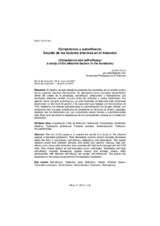Mostrar el registro sencillo del ítem
Competencia y autoeficacia: Estudio de los factores afectivos en el traductor
| dc.contributor.author | Albin, Joanna | |
| dc.date.accessioned | 2020-01-23T08:26:49Z | |
| dc.date.available | 2020-01-23T08:26:49Z | |
| dc.date.issued | 2012 | |
| dc.identifier.issn | 1579-9794 | |
| dc.identifier.uri | http://hdl.handle.net/10396/19358 | |
| dc.description.abstract | El objetivo de este trabajo es presentar los resultados de un estudio acerca de los aspectos afectivos del traductor. Su descripción toma conceptos desarrollados dentro del campo de la psicología: autoeficacia, atribuciones y motivaciones. Los resultados obtenidos revelan vínculos entre las actitudes y ciertas habilidades. Por ejemplo, tener una gran autoeficacia y un estilo favorable de atribución está claramente relacionado un alto nivel de gestión y de capacidad para trabajar con herramientas de TAO. Asimismo, los criterios aplicados para la autoevaluación son de gran utilidad. Los traductores con una gran autoeficacia se consideran en términos de dinero y prestigio, mientras que los traductores con una autoeficacia menor tienden a autoreferenciarse más. Esto pone de relieve la importancia de los componentes sociales en la traducción profesional. | es_ES |
| dc.description.abstract | The aim of this paper is to present the results of a study on the affective aspects of translator profession. Their description revolves around concepts developed within the field of psychology: self-efficacy, attributions and motivations. The results obtained reveal links between attitudes and certain skill patterns. Namely, high selfefficacy and a favourable attribution style correlate with high level management and CAT skills. Also, criteria applied for self-evaluation prove meaningful. Translators with high self-efficacy evaluate themselves against money and prestige criteria, while professionals with deficient self-efficacy are mostly self-referenced. This proves the importance of the social components in the translation profession | es_ES |
| dc.format.mimetype | application/pdf | es_ES |
| dc.language.iso | spa | es_ES |
| dc.publisher | UCOPress | es_ES |
| dc.rights | https://creativecommons.org/licenses/by-nc-nd/4.0/ | es_ES |
| dc.source | Hikma 11, 9-33 (2012) | es_ES |
| dc.subject | Autoeficacia | es_ES |
| dc.subject | Estilo de atribución | es_ES |
| dc.subject | Motivación | es_ES |
| dc.subject | Necesidades | es_ES |
| dc.subject | Elementos afectivos | es_ES |
| dc.subject | Traducción profesional | es_ES |
| dc.subject | Factores sociales | es_ES |
| dc.subject | Autoevaluación | es_ES |
| dc.subject | Traductor | es_ES |
| dc.subject | Autoaprendizaje | es_ES |
| dc.subject | Self-efficacy | es_ES |
| dc.subject | Attribution style | es_ES |
| dc.subject | Motivation | es_ES |
| dc.subject | Needs | es_ES |
| dc.subject | Affective factors | es_ES |
| dc.subject | Translation profession | es_ES |
| dc.subject | Social factors | es_ES |
| dc.subject | Self-evaluation | es_ES |
| dc.subject | Translator | es_ES |
| dc.subject | Self-learning | es_ES |
| dc.title | Competencia y autoeficacia: Estudio de los factores afectivos en el traductor | es_ES |
| dc.title.alternative | Competence and self-efficacy: a study of the affective factors in the translator | es_ES |
| dc.type | info:eu-repo/semantics/article | es_ES |
| dc.relation.publisherversion | https://www.uco.es/ucopress/ojs/index.php/hikma/index | es_ES |
| dc.rights.accessRights | info:eu-repo/semantics/openAccess | es_ES |

